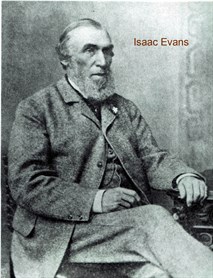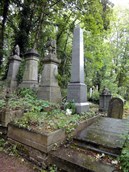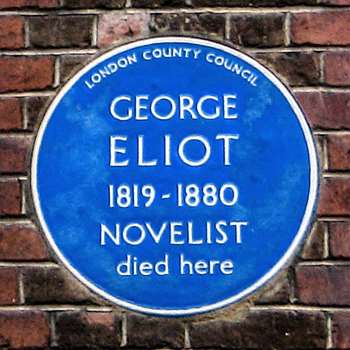Her Life
The George Eliot Fellowship
The Final Years
Throughout their life together Marian and Lewes suffered ill-health; but in 1878 Lewes became seriously ill and died in November. Marian was devastated. For months she became a recluse, seeing only her stepson Charles Lewes.
 However by the following spring Marian had allowed John Cross to visit her. They began to read and study together and visited art galleries and museums. By summer 1879, Cross was suggesting marriage. Marian was hesitant; she was twenty years his senior, but finally she accepted him in April 1880. They found a new home at 4 Cheyne Walk overlooking the Thames. Without telling anyone except the Cross family and Charles Lewes they married quietly on 6th May 1880 at St George's, Hanover Square. Marian Evans had finally became a respectable married woman.
However by the following spring Marian had allowed John Cross to visit her. They began to read and study together and visited art galleries and museums. By summer 1879, Cross was suggesting marriage. Marian was hesitant; she was twenty years his senior, but finally she accepted him in April 1880. They found a new home at 4 Cheyne Walk overlooking the Thames. Without telling anyone except the Cross family and Charles Lewes they married quietly on 6th May 1880 at St George's, Hanover Square. Marian Evans had finally became a respectable married woman.
 Marian and John Cross went on honeymoon to Italy commencing in Venice where Cross suffered a form of mental breakdown which led to him jumping in the Grand Canal. Whether this was due to the stench of the canal during the heat, or to John Cross being overwhelmed that he had married the most famous, most intelligent, most widely read, and after the Queen, the richest woman in Britain, we shall never know. However, after his rescue and recovery, five days later they were able to continue to Verona.
Marian and John Cross went on honeymoon to Italy commencing in Venice where Cross suffered a form of mental breakdown which led to him jumping in the Grand Canal. Whether this was due to the stench of the canal during the heat, or to John Cross being overwhelmed that he had married the most famous, most intelligent, most widely read, and after the Queen, the richest woman in Britain, we shall never know. However, after his rescue and recovery, five days later they were able to continue to Verona.
 On returning to England, to Marian's immense delight, she received a short letter of congratulations from her brother Issac, breaking a silence of 23 years.
On returning to England, to Marian's immense delight, she received a short letter of congratulations from her brother Issac, breaking a silence of 23 years.
Marian and John Cross spent the summer and autumn at The Heights and early in December moved to Chelsea. However Marian became ill with what was thought to be laryngitis, but which swiftly progressed to kidney disease. On the 22nd December 1880 George Eliot passed away.
George Eliot was buried in Highgate Cemetery in unconsecrated ground, next to Lewes. The Church of England would not allow her to be buried in Westminster Abbey. 100 years later, to commemorate the centenary of her death, a plaque was unveiled in Poets' Corner, the result of a campaign by the Fellowship, led by Kathleen and Bill Adams. Unveiled by Eliot biographer Gordon Haight before 700 guests, it was inscribed with a quotation from Janet's Repentance:
'The first condition of human goodness is something to love; the second, something to reverence'.
In 1885 John Cross wrote and published 'George Eliot's Life as Related in her Journals and Letters', the first of many biographies of this remarkable woman, transformed by George Henry Lewes' love into one of the greatest novelists of English literature.




